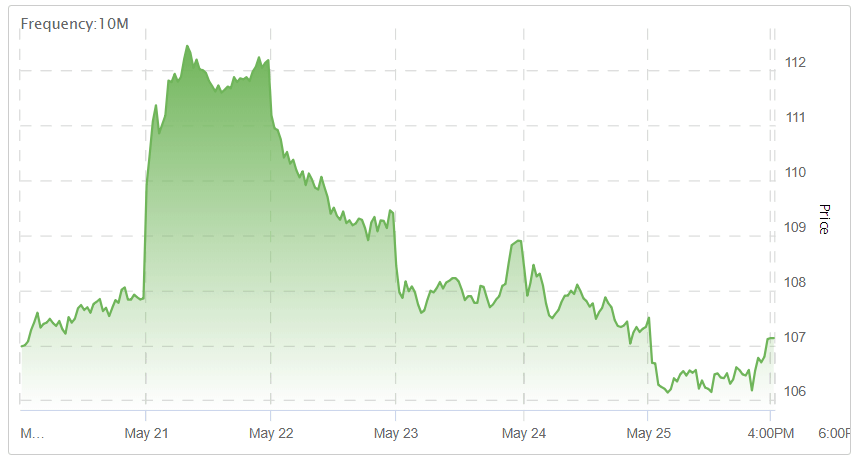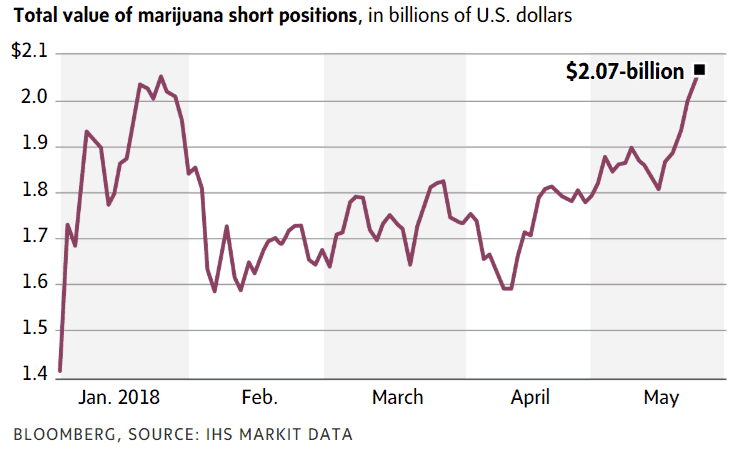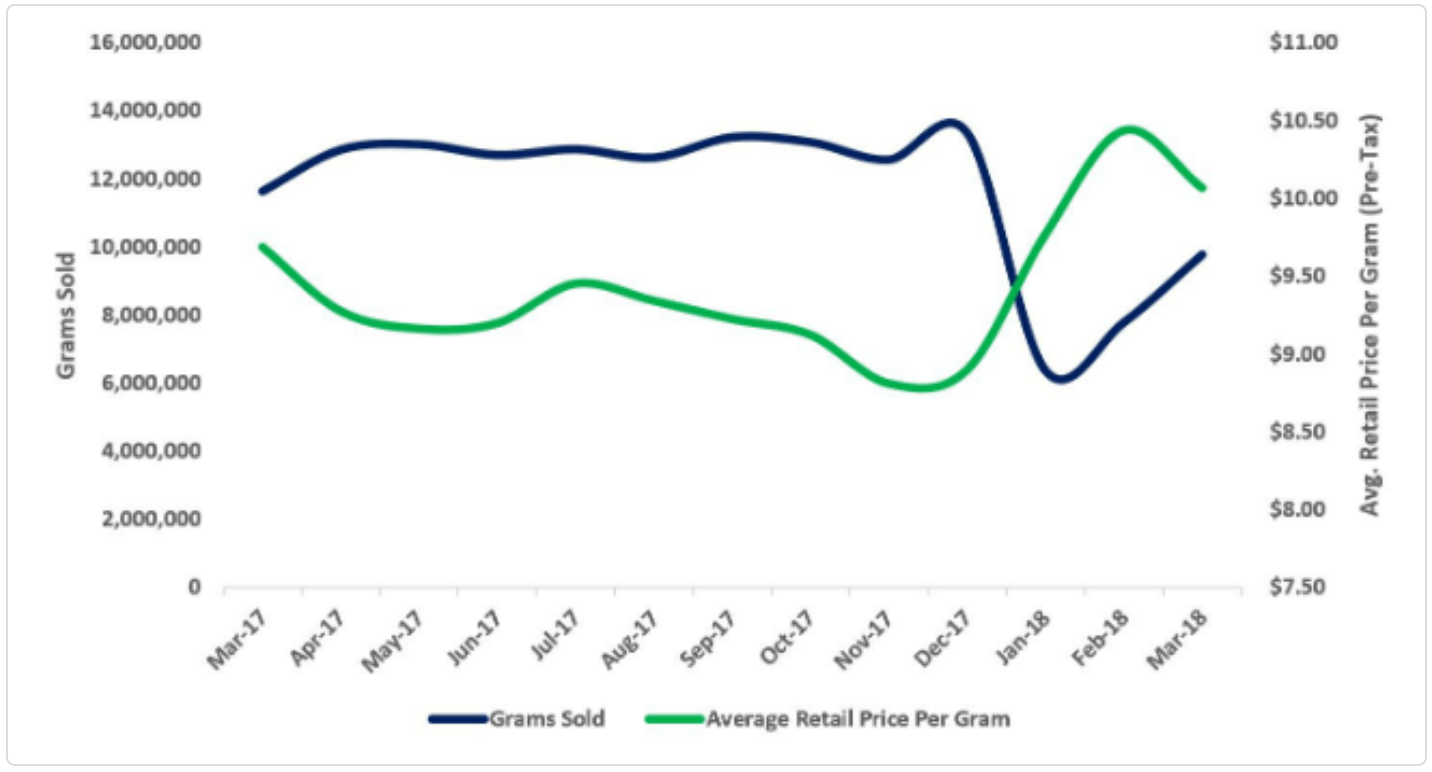Global Marijuana Stocks Down 1% for the Week, Underperforming Global Stock Markets
The global marijuana stock index had a volatile few days but ended the week down slightly less than 1%. Results were partially driven by Canopy Growth, which traded up sharply in anticipation of a US stock market listing and then sold off sharply on the day of the listing. A typical buy the anticipation then sell the news scenario.
Stocks may have have traded down later in the week after Senate hearings made it seem more likely that amendments may be introduced to the cannabis bill, pushing off legalization. We will know by May 29th if any amendments are being made to the bill.
In Canada, large caps were down 1.5%, mid caps declined 4.2%, and small caps decreased 3%.
Grizzle thinks the industry will require legal supply bottlenecks and higher prices after legalization to push the stocks any higher at current valuations. Less profitable government contracts are not at all priced into marijuana stocks. Any stock price gains after legalization would only be temporary and when legal prices begin falling, as Grizzle expects, the only direction stocks will go is down at current valuations.
WEEKLY PERFORMANCE OF THE TOP 75 GLOBAL MARIJUANA COMPANIES

Source: New Cannabis Ventures
Marijuana Short Positions Reach Record High
According to IHS Markit data, the value of marijuana shares sold short is even higher than when marijuana stocks were at all time highs in January. With many new shares issued since January this doesn’t necessarily mean a higher percentage of available shares are now sold short, but it does point to growing pessimism among investors.
Short selling is also getting easier as the cost to borrow shares is now below 20% a year, compared to over 50% as recently as February. The cheaper it is to borrow shares the less a stock needs to go down to make you money and the longer you can stay short and wait for your thesis to play out.
What is Selling Short?
Short selling is when investor A borrows shares from investor B and then sells those shares for cash to investor C. Investor A is betting the stock price will fall and when they need to return the shares they borrowed to investor B they can buy them back on the stock market for cheaper than they sold them for, making a profit.

Source: Bloomberg, IHS Markit Data
What Does this mean for Stocks?
A high percentage of stocks sold short means investors are more pessimistic about the business prospects of the company. Short selling if done in large enough size can put downward pressure on a stocks price. On the flip side, if the stock continues to increase in price, short sellers may be forced to buy back shares and close their positions leading to a sharp increase in the stock’s price. Watch the number of shares sold short as a percentage of total shares outstanding to see if investor pessimism is going up or down.
Cannabis Drug Czar Gives More Details on Legalization Timeline in Canada
Eric Costen, director general of Health Canada’s Cannabis Legalization and Regulation Secretariat, spoke at a marijuana conference on the 24th and laid out the potential path forward for legalization.
The senate will read bill C-45 for the final time on June 7, but if the Senate decides to propose any amendments then the bill has to go back to the House for another vote. Even if the bill passes the Senate with no amendments on June 7th it will take at least 3 months before legal sales will actually begin. This implies legalization will happen in September at the earliest, if everything goes smoothly.
A senior policy advisor to the government tweeted Friday that senators have to send in their proposed amendments by the end of the day and the amendments will be addressed by the Senate on Tuesday May 29th. Seems the Senate is trying to have amendments passed and ready for voting in time for the third reading of the marijuana bill June 7. It’s a very tight timeline, however, so the chances of an amendment not pushing back the legalization vote are low in our opinion.
BMO Raises $100 Million for Cannabis Wheaton only 12 months after the CEO Torpedoed a Prior Raise Due to Backroom Dealings
BMO agreed to conduct a $100 million bought deal equity financing for Cannabis Wheaton (Ticker: CBW). In a bought deal the investment bank (BMO) agrees to personally buy the entire share of stock and will subsequently sell the shares on to its clients.
What is surprising about this deal is that BMO would move forward even with the ethical clouds hanging over the head of Cannabis Wheaton’s CEO Chuck Rifici. Just over one year ago Cannabis Wheaton tried to do an equity raise with Eight Capital and Cannacord Genuity.
The deal fell apart when the management of both banks discovered that Mr. Rifici had agreed to secret compensation deals with employees of both firms, unknown to management. The employees were going to receive shares and warrants worth millions of dollars for a massive discount to the offering price.
Implications for Marijuana Stocks in Canada
The scuttled deal spearheaded by Rifici is just another example of the ethical lapses we are seeing among the executive suite of licensed producer stocks. The fact that BMO is going ahead with this equity raise anyway shows that investors need to do their own due diligence on management because they can’t rely on the finance community to do it for them.

Khiron Life Sciences Reveals Construction and Marijuana Growing Costs in Colombia
Khiron Life Sciences is the first Colombian licensed producer to trade on a Canadian exchange. The company held an investor call yesterday and revealed some useful information about growing and construction costs in Colombia compared to Canada.
Khiron revealed that their cost of production will be $0.34 per gram, compared to $1.50 on average for Canadian producers. In addition, this cost is for marijuana grown using hydroponics in climate-controlled indoor greenhouses, which is much more costly than growing outdoors. If growers move to simple covered greenhouses in the future, costs could fall to $0.05 per gram according to PharmaCielo, another Colombia grower.
What This Means for Licensed Producers in Canada
Colombian growers have raised $80 million so far in Canada, enough to build 240,000 kg of capacity based on construction costs in Colombia. Grizzle estimates medical demand in Colombia at 75,000 kg in the medium-term, so Colombian exports of marijuana oil could directly compete with marijuana products in Canada very soon.
Colombia has lower growing costs than Canada and a supportive government and could become a marijuana export powerhouse in the future. The opportunity for Canada to supply Europe, Australia and South America may not be as large as the stock market expects.
This is What Happens When Legal Marijuana is Too Expensive (California Edition)
Recent data from BDS Analytics on sales volumes and prices in a now legal California shows what can happen to the legal market if pricing is too expensive compared to black market supply. In January when California legalized marijuana, many illegal growers had not converted to legal licenses, leading to a shortage of legal marijuana. The shortage caused prices to increase sharply, up 20%.
Well guess what happened……
Legal sales fell by more than 50% as consumers switched to cheaper products or went back to the black market altogether.
California Grams Sold and Price Per Gram

Source: BDS Analytics
How Does this Impact Canada
Canada has a thriving black market, similar to California, and should be watching the outcome of sales in that state very closely. California demonstrates that if legal prices are too much higher than the black market consumers won’t switch. The government of Prime Minister Trudeau needs to think long and hard about how they price marijuana in government-owned stores or else their goal of eradicating the black market will never be realized.
Lower prices are good for legal adoption, but bad for a licensed producer’s bottom line.
READ THE MARIJUANA EXPORT MIRAGE FOR AN IN-DEPTH REPORT ON THE STATE OF DEMAND FOR MEDICAL MARIJUANA OUTSIDE OF CANADA
About Author
The opinions provided in this article are those of the author and do not constitute investment advice. Readers should assume that the author and/or employees of Grizzle hold positions in the company or companies mentioned in the article. For more information, please see our Content Disclaimer.
